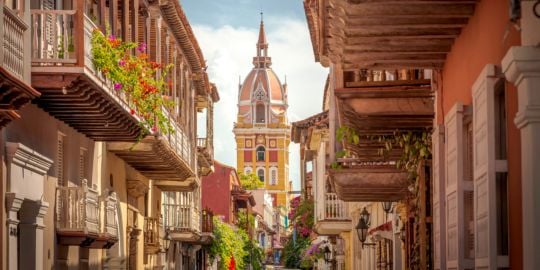Does your lawyer charge Gringo prices? What services do you use her for?
The only lawyer I knpw of in Manizales is a crook..
Clarifying Tax on U.S. Expats in Colombia
Sounds like a great idea...some conversation and coffee!
My husband and I are still 10 yrs away from retirement, but Medellin is on our list, along with MX, Spain, and Italy. The tax issue definitely is one we plan on studying a lot more.
In our case, we would both have Gov pensions ( mine close to $17,000 and his $14,000), and any withdrawals from our Roth IRA and Traditional IRA's to pad the pension income. We would both be 62 at the time, so we were thinking of waiting to collect Social Security. Our savings, and the proceeds from the sale of our home at the time would likely be around a total of $400,000. We were thinking of selling our house a year prior to retirement and rent. That way we can scale down on any unwanted things we don't plan on hauling with us when we retire, and just focus on the paperwork, etc. needed to get our residency in our country of choice.
No one can see the future with great accuracy, except perhaps with some luck. No one knows how strong or weak the US dollar might be 10 years from now. No one knows how bad inflation might be in any country.
But now, your combined pensions of $31K or so would give you a solid upper-middle-class existence in Colombia. Perhaps not so much in some parts of Medellín, but there are many other areas in Colombia that are cheaper, safer, more picturesque and with nicer weather. But everyone has their own wants and needs.
Ecuador might be a place to consider if only for one reason: They do not tax foreign pensions, or any foreign income. Ecuador is perhaps a bit backward compared to Colombia, but many places in Ecuador offer all the modern amenities and also less crime overall.
If you are able and willing to keep working, your Social Security goes up some 8% per year assuming your full retirement age is 66. So if you retired at the maximum age of 70 you would get 132% of what you would get at age 66.
It might also be possible to down-size from your current home, and purchase a smaller, less-expensive home close to an airport which has good prices and service to overseas destinations - and spend part of the year in the US and part in your overseas home (which could be and perhaps should be a rental). And/or travel to other destinations as well.
The one thing overall I would recommend is to be flexible. No need to lock yourself in to something that you later could not change easily or cheaply.
I would not move any financial assets outside the U.S. I would rent an AirBnb for six months in Medellin to see how I like it. I would then maybe try Ecuador for a few months and then maybe Spain. We have some friends that have been moving around the world like that for over twenty years and they really enjoy that kind of living.
Thank you for the suggestions. Our financial advisor here keeps telling that we should be more than fine with combined amounts in our IRA's to pad the pension and wait on SS, and not really keen on the thought of working past 62. We also have two lots in Belize on Ambergris Caye that we will eventually sell. My husband bought them over 10 years ago, and he has family there. But we scratched it off our list because we would like a bit more culture/city life, as well as access to better medical care in our retirement years.
Some of our friends think we are crazy always talking about retirement plans. But it takes time to research, go visit an area once, twice, three times. Last year we went to Merida, MX…lots going to there, but I think the heat would drain me. That's why Medellin appeals to us.
Ridgebackmix wrote:We also have two lots in Belize on Ambergris Caye that we will eventually sell. My husband bought them over 10 years ago, and he has family there. But we scratched it off our list because we would like a bit more culture/city life, as well as access to better medical care.
Dear Ridgebackmix,
If the Belize properties are not on the market yet, I would make arrangements to get them sold or at least shown.
Properties in Latin America that do not have adequate access to medical care and urban culture are a questionable investment. More importantly, properties in this region can take multiple years to sell, so the sooner on the market, the less time the potential sale will drag on. Closings can be grindingly slow in many cases. Typically, the way to move property in a buyer's market is to mark down the price until interested parties appear.
cccmedia
Ridgebackmix wrote:Last year we went to Merida, MX…lots going to there, but I think the heat would drain me.
I used to fly in to Mérida, México in the 1980s and really enjoyed it for the culture and the people and the relative safety back then, to be able to rent a car and drive around. I'm not sure it's as safe anymore. And you're right, the heat there can be really oppressive at any time of the year...
You are correct. You need to stay in the US, or Taiwan, anywhere but Colombia. It can get complicated. Having said that, I love it here and pay very little in the way of taxes outside of my US tax obligations. I have a good accountant who contacts DIAN and they tell her what my tax contribution will be. It's surprisingly low every year.
Landstryker wrote:I pay very little in the way of taxes outside of my US tax obligations. I have a good accountant who contacts DIAN and they tell her what my tax contribution will be. It's surprisingly low every year.
Hello, Martha. We rarely get as unqualified a recommendation on this forum for a good accountant as you just gave.
Are you willing to give out her contact information to benefit other members, either on the forum or via PM private messaging?
FYI to other members... Expats may successfully hire accountants and attorneys from cities other than where they live in Colombia .. or stayed previously.
cccmedia
Landstryker wrote:You need to stay in the US, or Taiwan, anywhere but Colombia. It can get complicated. Having said that, I love it here and pay very little in the way of taxes outside of my US tax obligations.
Care to elaborate on this apparent contradiction, Martha?
It's definitely different visiting somewhere and living full time. I just don't think I could tolerate living in a hot and humid climate. I've been to Colombia twice…fist time in 2011. The climate in Medellin is very appealing.
BTW, has there ever been talk of a tax treaty with the US similar to the EU?
Ridgebackmix wrote:We were thinking of selling our house a year prior to retirement and rent. That way we can scale down on any unwanted things we don't plan on hauling with us when we retire, and just focus on the paperwork, etc. needed to get our residency in our country of choice.
Brilliant! 
Too many arriving Expats wind up spending their first months with one foot figuratively stuck in their original country, dealing with moving stuff to their South American destination.
And/or they are putting time and energy into buying a place in the new destination .. before they really know that the new place is right for them on a long-term basis. 
Ridgebackmix and her husband have the right priorities. 
cccmedia
be ready to pay fees, for lack of a better word for most services, it is difficult to setup a bank account and takes 5 years to get citizenship in Colombia. be wary of buying real estate, if you do you will find it exasperating, lengthy, and riddled with extra fees at every turn. then there are taxes you will need to address and will need a good lawyer. a decent lawyer is crucial and hard to find. if you look into buying real estate watch out as anyone can sell real estate; we got hoodwinked by a guy who purports to sell "the colombian dream vacation home."
Jerig wrote:be wary of buying real estate, if you do you will find it exasperating, lengthy, and riddled with extra fees at every turn. then there are taxes you will need to address and will need a good lawyer.
Real estate taxes are rarely the focus of disenchanted Expat home buyers .. although Jeri's experience may be worse than average. The possibility she notes about exasperation and long, drawn-out transactions is real. Potentially, the most exasperation comes when an Expat discovers he/she cannot readily unload a property after realizing the home/area/departamento they chose was not a good long-term choice.
The big knock on Colombia when it comes to taxation is the opaque system of taxation on worldwide income.
Even the accountants in Colombia -- and I questioned a number of them the year after I spent more than 10 consecutive months in La República -- cannot agree on an Expat's tax obligation regarding income gained outside Colombia's borders.
One accountant (a referral from a top attorney) said I owed $8,000 US. Another accountant said I owed nothing. A third accountant said it would cost me $900 for him to figure out what I owed.
It has been widely reported that if you spend more than half the year in Colombia, or more than 183 days out of any 365 consecutive days in-country, the tax agency La DIAN can clip you for a chunk of your worldwide income. I have seen occasional anecdotal reports on Expat forums of La DIAN pursuing an Expat, but these are few and far between.
Many Expats apparently keep a low profile in Colombia to stay off DIAN radar .. possibly considering a back-door strategy for the perhaps unlikely event that they may get targeted for overdue taxes and penalties.
From time to time, an Expat posts about how 'tax residents' should proactively do the right thing by Colombia. Other posters have posited that Colombia's Inmigración may have been developing digital capabilities to inform the tax agency which Expats have overstayed their six months and automatically became tax residents for given year(s).
But in the era of The Situation, nobody outside the government seems to know for sure of any financial consequences an Expat faces if the individual is determined to duck the supposed worldwide tax system that snowbirds learned to fear.
cccmedia
Actually, I'm gay. LOL. No worries 😉
Good morning.
What if someone had an income of $150,000 US?
Could you explain (detail) the tax liability of a US Citizen residing in Colombia with the following:
Pension income $150,000 US?
Rents an apartment and has minimal assets.
Maybe this would help resolve the conversation about a $30,000 Colombian tax liability?
Thanks
Ronaldo / i am not a tax accountant thats why i hired a competent and skilled tax firm to provide those services. I can prove name etv to you.
Thank you for responding. I sometimes use the same accountant in MDE that most use. Unfortunately, she has raised her fees substantially.
I was looking for opinions and practical tax experience from members with high pension incomes.
Im curious if anyone knows if 401k or IRA account appreciation is taxed in Colombia, even though they are tax free in the US? I had an accountant who said the Dian doesn't recognize the tax benefits so any stock appreciation in such accts would be taxed as normal stock transactions which is a major bummer. They would also tax gross income, not after 401k allocation. Similarly he said that if you have stock carry forward losses those won't be considered by the DIan for tax purposes. Also, most deductions accepted in the US aren't recognized here. I'm hoping someone here can tell me he is wrong?
jmckenna71 wrote:Im curious if anyone knows if 401k or IRA account appreciation is taxed in Colombia, even though they are tax free in the US? I had an accountant who said the Dian doesn't recognize the tax benefits so any stock appreciation in such accts would be taxed as normal stock transactions which is a major bummer.... Similarly he said that if you have stock carry forward losses those won't be considered by the DIan for tax purposes. Also, most deductions accepted in the US aren't recognized here. I'm hoping someone here can tell me he is wrong?
Dear jmckenna,
Welcome to the Colombia forums of Expat.com ...
It shouldn't be hard to find a tax expert who disagrees with said accountant.
And it's worth the effort to look for a sharper accountant.
Money that appreciates inside a brokerage account, regardless of whether it is theoretically a taxable account, is not income if left inside the account. While Colombia could lay claim to assets that appreciated and were subsequently distributed/withdrawn, the tax agency would be overstepping if it tried to tax unrealized potential profits still inside the account.
Appreciated assets taken in a distribution out of a retirement account, if considered income, should be taxed at the lower capital gains rate (provided the asset holding period exceeds any time limit that is relevant). In Colombia, inheritances have historically been considered capital gains. Capital gains have been taxed at ten percent in Colombia.
----
Choose an accountant who will advocate for you paying the lowest tax amounts legally permitted .. and watch out for the other kind and for Expats who want other Expats to pay more than is necessary due to a questionably-informed interpretation of tax-collection realities in Colombia.
The deductions accepted by La DIAN may vary from year to year. Make sure your tax expert is up to date.
Some taxes already paid in the USA are generally deductible from one's Colombia tax obligation. Since the annual tax-reporting requirement is several months later in Colombia compared to the USA requirement, demonstrating such deductions to La DIAN may not be a problem.
cccmedia in Ipiales, Nariño
Simple / integrity works
Sure / you are in colombia / everybody will gringo guoge. Have nots want the haves have. I have a simple solution - No - F*** Y** that is global acceptable
@OsageArcher
For instance he wants to increase the capital gains tax, on ganancias ocasionales, to 30%. He is proposing a tax on gaseosas, not for the money he says but because they're not good for you, because of the sugar.
He proposes doing away with the days-without-paying-IVA (VAT) which many poor wait for to avoid paying that 19% tax on goods (and maybe increasing the IVA to 20% as well).
But for now, only income - that's when it's distributed - is reported and taxed on your declaración de renta. Growth when it's in an account is not taxed as income.
In the U.S. a single person for 2022 has a 0% tax rate on up to 12,900. However, long-term capital gains are at a 0% tax rate if your taxable income is around $41,000. This year and next year I am selling individual stocks I hold (outside an IRA account) in order to realize capital gains in order to tax advantage of my 0% tax rate and to possibly prevent Colombia from taxing them at 19% or 28%, whatever the case may be, if I were to move there.Note that 1 UVT for 2022 equals 38,004 COP and then you must do the calculations using the exchange rate - but for now, up to about $12K USD annual income you pay 0%, then 19%, then 28%, then 33%, at the UVT limits specified in the tax table.
Even the accountants in Colombia -- and I questioned a number of them the year after I spent more than 10 consecutive months in La República -- cannot agree on an Expat's tax obligation regarding income gained outside Colombia's borders.
One accountant (a referral from a top attorney) said I owed $8,000 US. Another accountant said I owed nothing. A third accountant said it would cost me $900 for him to figure out what I owed.
Note that there is some debate in the accounting/tax community in Colombia as to whether these thresholds should measure Colombian-only activity or whether they need to include activity on a worldwide basis. Our accountants interpret the relevant rules to include worldwide activity.
Foreign Residents. If you plan to actually reside in Colombia the risk involved in not filing a local tax return increases substantially, particularly for foreigners who own businesses and/or invest in local assets like real estate. It is not uncommon for local tax authorities to attempt to seize personal assets in order to satisfy local tax obligations.
It should be noted that tax collection has become a significant imperative for the Colombian government as a result of the massive economic downturn caused by the Covid pandemic. We expect tax enforcement to ramp up as the local government attempts to secure as much tax revenue as possible over the medium and long-term
Reason : Potentially defamatory
We invite you to read the forum code of conduct
Fortunately for me, by then I was savvy enough to know that Colombia's tax law was hard to interpret .. and subject to various interpretations by various experts
Las personas naturales, nacionales o extranjeras, residentes en el país están sujetas al Impuesto Sobre la Renta y Complementarios en lo concerniente a sus rentas y ganancias ocasionales, tanto de fuente nacional como de fuente extranjera, y a su patrimonio poseído dentro y fuera del país.









